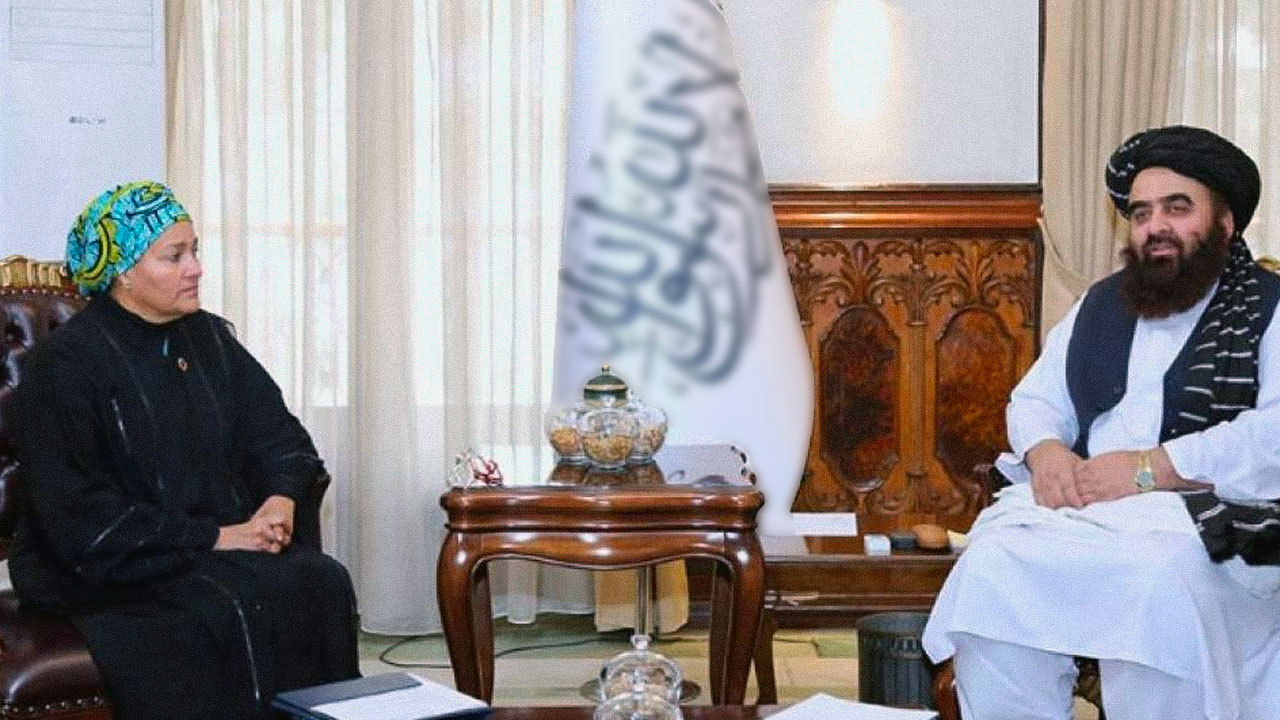UN Deputy Secretary-General Amina Mohammed has recently stated that the recognition of the Taliban will be up for discussion at the upcoming United Nations meeting on May 1. This development raises the question of what it will take for the international community to cease its prolonged efforts to grant privilege and supplicate against a terrorist group.
The Doha agreement between the US and the Taliban resulted in the overthrow of Afghanistan’s republican system, paving the way for the rule of terrorism in the country. In the aftermath, the United Nations began to engage with the Taliban, resulting in significant financial aid flowing into Kabul every week, besides lobbying, and providing political opportunities for the Taliban. Currently, there are even discussions about recognizing the Taliban as the legitimate government of Afghanistan.
However, there appears to be a discrepancy between the statements of the UN Deputy Secretary General, Amina Mohammed, and the administrator of the United Nations Development Programme, Achim Steiner, regarding the United Nations’ engagement with the Taliban in Afghanistan. In an interview with the Associated Press, Steiner stated that if the UN cannot come to an agreement with the Taliban regarding women’s right to work, it may be forced to withdraw from Afghanistan in May. Amina Mohammed, on the other hand, stated during a meeting on Afghanistan at Princeton University that leaving Afghanistan is not on the UN’s agenda and that discussions will be held during the upcoming meeting regarding ways to recognize the Taliban.
These statements by senior United Nations officials regarding the Taliban and Afghanistan come at a time when the Taliban, before coming to power, were blacklisted by several countries and international organizations as a terrorist group. The Taliban’s rise to power was the result of violence and deals, and since their occupation of Kabul in August 2021, they have committed numerous crimes against humanity and war crimes, including but not limited to gender apartheid against women, the genocide of the Hazaras, massacres of prisoners of war, land usurpation of indigenous people, forced migration, kidnapping, torture, and killings of protesters and critics. This list of crimes against humanity is only growing longer, as the Taliban continue to expand the geographical scope of their crimes in the region and the world with the suicide corps they have created and the financial aid they receive from the United Nations and the United States.
The Taliban are widely known as a terrorist group by the people of Afghanistan, and it is rare to find a family that has not been affected by their violence and brutality. Everyone in the country has been directly or indirectly affected by the Taliban’s crimes. As a result, the Taliban have no social base or popularity. With the possibility of the United Nations recognizing the Taliban, reactions from people across Afghanistan and Afghan immigrants worldwide show that no specific geographic area desires the recognition or continued dominance of terrorism over their homeland and destiny.
The priorities of the United Nations and the international community, however, do not align with the desires and needs of the Afghan people. In fact, the Afghan people’s priorities, desires, and lives are given minimum consideration during sensitive political negotiations, just as women’s rights were notably absent from the Doha peace talks. The United Nations has defined its mission in Afghanistan as promoting peace, human rights, and development. However, the current engagement with the Taliban raises concerns and questions as the group has a history of disregarding human rights and considering them as “Western and infidelic values” that they do not recognize. The potential recognition of the Taliban by the international community in the name of engagement and peace negotiations could signal a lack of commitment to the fundamental human rights of the Afghan people. The Taliban came to power through war and now seeks to expand terrorism by creating suicide squads and corps, providing shelter for other terrorist groups in Afghanistan. The recent killing of the Al-Qaeda leader in Kabul is a prime example of the Taliban’s collaboration with international terrorists. Moreover, the Taliban have sabotaged small development and humanitarian projects of the United Nations by prohibiting female employees from working.
The current situation in Afghanistan reflects the failure of the international community’s policy of appeasement towards terrorism and the ineffectiveness of the United Nations envoys in the country. Now, the United Nations is faced with a difficult decision to either withdraw entirely from Afghanistan or recognize the Taliban. This recognition will provide a platform for the continuation, growth, and spread of terrorism, which will have devastating consequences globally. In exchange for this recognition, the Taliban will make commitments to allow for some small humanitarian projects through UNAMA institutions. However, these projects are unlikely to have a significant impact on the lives and well-being of Afghan citizens.
Recognizing the Taliban, as highlighted by a high-ranking UN official, is not a commonplace remark. The gravity of the situation demands that Afghanistan’s citizens take the matter seriously, refusing to legitimize terrorist rule or allow such a government to take root in the country. In the wake of a recent UNAMA statement characterizing the situation as a “terrible choice,” the international community is now faced with a difficult decision between supporting a terrorist group or standing in solidarity with the pro-democracy populace of Afghanistan. Upholding their legal obligations, the UN and its partners cannot support terrorism in any form. Afghanistan holds a seat in the UN, and its people are entitled to global support in their quest to overthrow a regime that seized power through a dubious political-intelligence arrangement. There can be no tolerance for terrorism in the long term.






